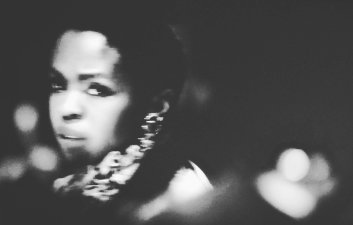Love Is The Message, The Message Is Death, Tate Liverpool, until 12th May, free
The moment which feels most central to Love Is The Message, The Message Is Death comes halfway through, when actress Amandla Stenberg asks to the camera “What would America be like if we loved black people as much as we love black culture?”. Arthur Jafa’s film is perhaps the most effective exploration of this difference in perception that I’ve ever seen. It’s rare for art to leave me feeling quite so emotionally shaken.

Love Is The Message, The Message Is Death is crafted out of found footage of moments from black American history and culture. There’s a great energy to it, some of which comes from being set to the energetic pace of Kanye West’s Ultralight Beam, which fits the footage and editing perfectly. Most of this footage is celebratory and upbeat. From groups of people dancing (lots of dancing!), to children playing together, moments of class from sports players I can’t name due to my ignorance of American sports and shots of Jafa’s daughter on her wedding day, this film is full of the moments that make life sing.
But My God, undercutting it all is the brutality. Real recordings of police and other institutionalise occur way, way more often than they should be able to. Jafa has definitely made the right call not shying away from it – it hurts. It’s absolutely fucked up. All these moments of expressing happiness and energy, constantly interrupted by fear and hate. And it left me feeling so fucking angry and upset.
It also gives another purpose to the presents of celebrities – Obama, Beyonce, Hendrix, James Brown, amongst others. On the one hand, they’re here to rightfully celebrate black achievement. But it also feels like they’re also here for a more nuanced purpose. Amidst the violence, these are people whose iconic status can too easily paper over the reality. “We can’t be racist – we love Beyonce!”, they can say, whilst simultaneously looking the other way as a black person in their neighbourhood is pulled over and may very well be fearing for their lives. This, of course, isn’t Beyonce’s fault, or Hendrix’s, or that of any of theirs. But it brings home exactly why Stenberg’s quote needs to be said and listened to. While we live in a society where individuals can be idolised and imitated whilst structural racism condemns the same traits in the wider society which birthed them, it needs to be said, and films like this need to be made to hammer it home.

There’s another recurring theme of images borrowed from science fiction, which I think captures what Jafa’s trying to say. We’re shown the sun in close-up, awesome and life-giving (featured image). But the sun is also something we’re taught to be afraid of, to look away and hide ourselves away from. It feels like an ideal metaphor, speaking both to the brightness of aspiration and talent, and how reality is all too easily avoided.
Now, I’m wary about making statements about what Love Is The Message, The Message Is Death might definitely say about the lived black experience. I’m not exactly in a position to make from personal knowledge. But there’s clearly a message Jafa wants any viewer to understand about what it is to be black in America. It’s one which left me on the verge of tears for the injustice that ordinary people who have to, live in a society that, at fundamental levels, doesn’t show respect. As a social comment, political statement and – don’t let it be forgotten – as an ode to black culture, this film is the most powerful 7 minutes you’ll probably see this year.
